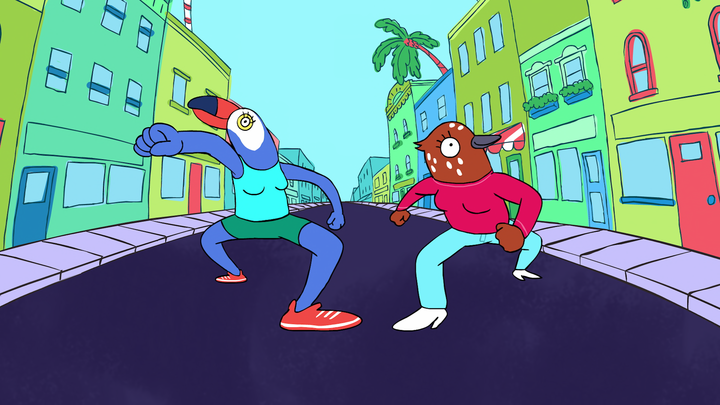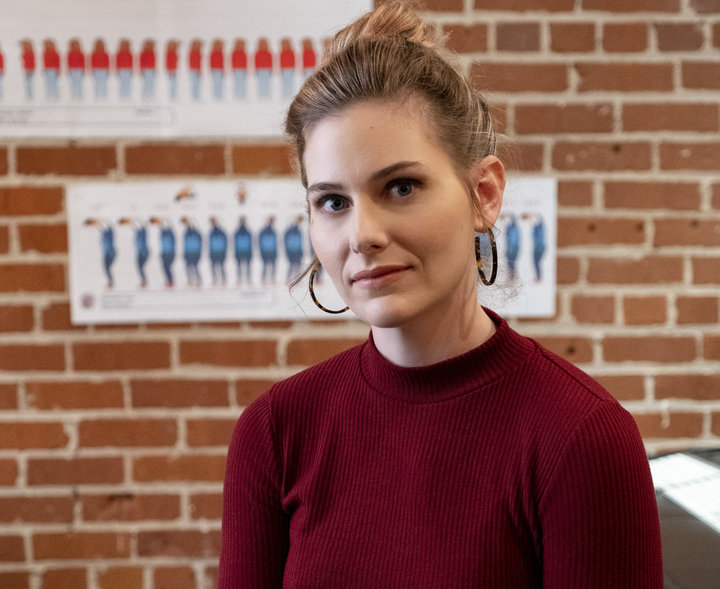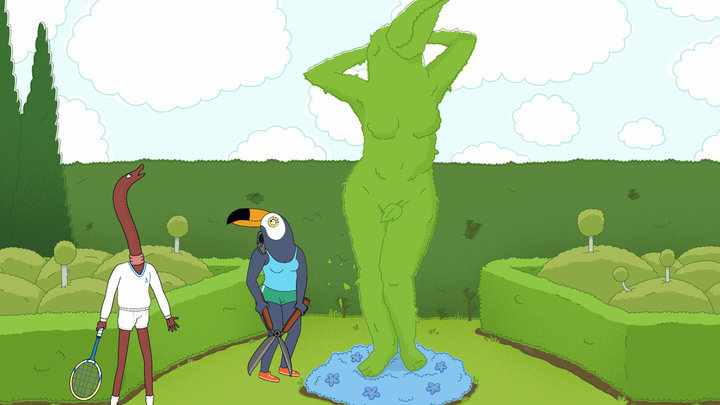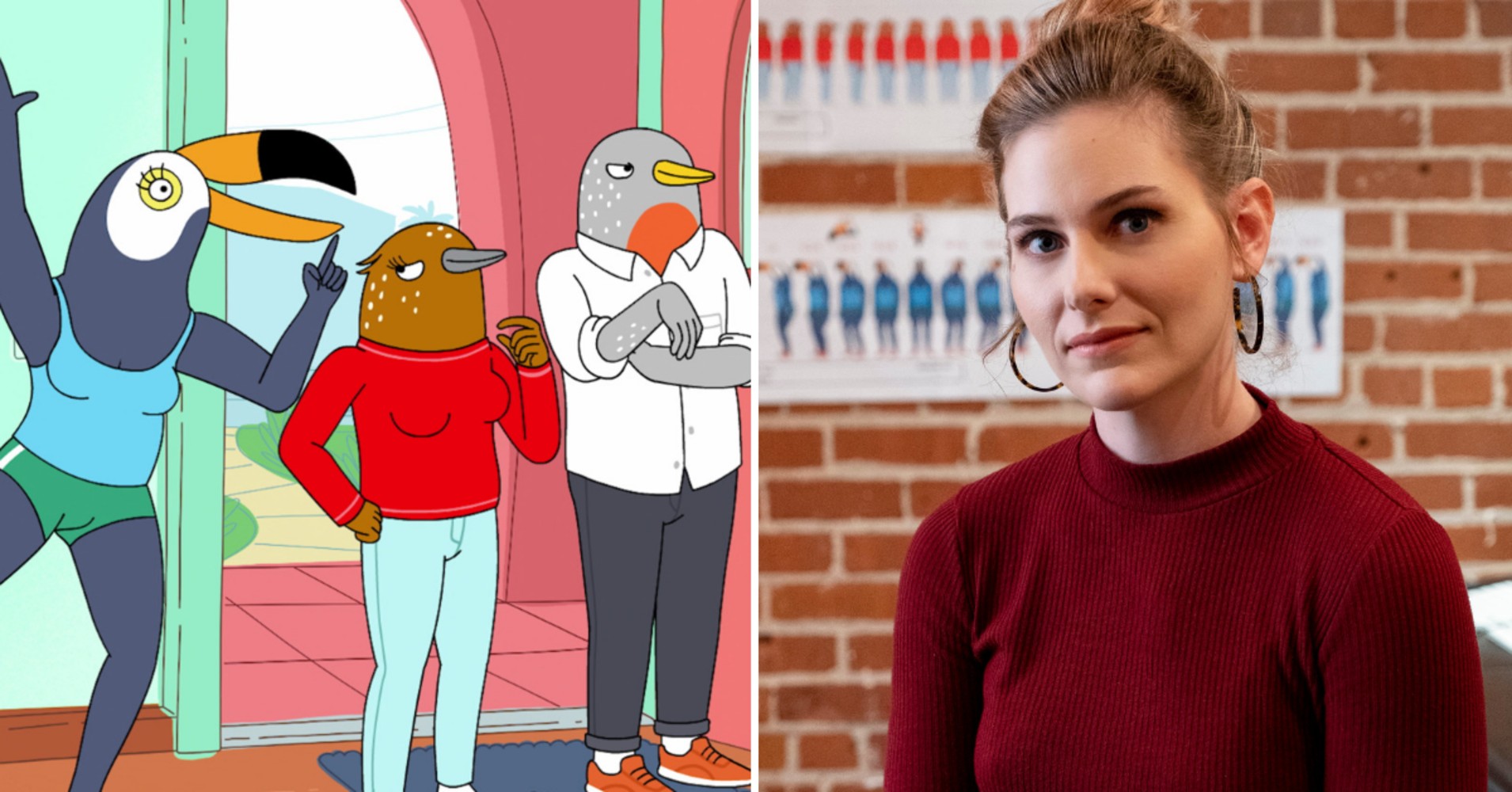[ad_1]
One of the first things you notice about Netflix’s new animated show “Tuca & Bertie” are the boobs. They’re right there in the intro, on a building facade, bouncing along with the certified bop of a theme song.
They’re elsewhere, too — on birds, on plant people. In one scene, after a character gets sexually harassed, her boob literally comes to life, pops off and runs away, declaring it needs a break from all the stress.
“I think it’s really funny to take something sexy and re-contextualize it so it’s maybe still sexy but maybe not,” show creator Lisa Hanawalt told me in a phone conversation about the series, which dropped its full season on the streaming service Friday. “It’s unclear. it’s definitely weird.”
Placing the bouncing boobs right at the top of the series sends a message about what type of show this is from the start.
“This is an adult show. This is not for children,” said Hanawalt, who has also worked as supervising producer and production designer on Netflix’s “BoJack Horseman.” “Weird stuff is gonna happen, and it’s OK. If you don’t like this, then maybe you don’t wanna watch more. It’s kind of like a warning.”
But if you do want to watch more, you’ll be richly rewarded. “Tuca & Bertie” is a pure delight, showcasing the often out-there but deeply relatable experiences of a brassy toucan and a “fussbudget” song thrush voiced by Tiffany Haddish and Ali Wong, respectively. They’ve been best friends for a while, and their lives are changing, but they still manage to take on whatever wacky stuff life hurls at them head-on.
Hanawalt describes the series as “warm and optimistic,” and it’s fitting: Her characters have problems to solve, but they do so in a world where they’re allowed to be gross and mess up and freak out — and, at the end of the day, still be OK. Even as the series delves into deeper issues, such as past trauma and sexual assault, it remains hopeful.
Below, we discuss how “Tuca & Bertie” came to be, what it was like getting Tiffany Haddish on board, and how Hanawalt tackled the show’s trickier storylines.

How long have you been drawing Tuca, and where did the idea for her come from?
I first started drawing her in 2013. I got asked if I wanted to do a web comic for [Hazlitt.net]. And I had been watching this nature documentary with toucans in it where they were reaching into other birds’ nests and gobbling up their eggs, and I just really related to that because sometimes I’m, like, kind of greedy with food. So I made up this character who’s kind of like my id, like, she was kind of selfish and bratty. And that’s where she began.
And then I made up Bertie a little later. I made this comic for Lucky Peach magazine called “Planting” about a couple who wants to buy a home. And then they buy one, and she’s, like, filling it up with all these plants. And then when I was talking to Raphael [Bob-Waksberg] — who’s a creator on “BoJack” and an EP on “Tuca & Bertie” — about TV show ideas, Tuca just seemed like a natural character to go with. She just felt like such a strong character to me. Like, I could just write for her very easily. And then Bertie felt like a great counterpoint to her. Because I wanted to make a show focusing on female friendship.
Is there something about birds in particular that really interests you in terms of building a whole world around them?
I think they’re really funny. I find them very cute, but I also find them a little bit scary and alien. You know they’re not quite as human and cute as a kitten or a puppy would be. And I like that there are so many different varieties of them, so it can really kind of flesh out a whole town very easily with different types of bird. Yeah, I just really like drawing them and thinking about them.
I feel like there’s a contingent of people who are really involved with birds on Twitter. Are you involved with Bird Internet at all?
I am a little bit. I’m more involved with Horse Internet at this moment, but Bird Internet is also nice. A little subtler, maybe. I follow a lot of strange bird Twitters, where they’ll kind of post pictures of beautiful birds.
Were you part of the frenzy over the hot duck in Central Park?
I was following it, yes. With interest. That Mandarin duck was very beautiful.
I feel like in terms of cultural frenzy around birds, that was an important moment.
That was an important moment for birds. Very good. I can’t remember the last moment that birds had such a good spotlight.
So when did you decide these two characters could make up a show together?
That just kind of happened in talking to Raphael and my other producers, Noel and Steve. We were just kind of bopping back and forth, just casually talking about how I could make a TV show. And originally, the idea was to do more of an anthology with lots of different parts because a lot of my books are kind of like that. Like, they’ll be short comics about one thing, and then a page of this thing, and then a list. But then the more we talked, the more I wanted to focus on a main character or two.
And then Tuca was my favorite idea, but it felt like too much to just focus a show just on her. And I felt like she needed a counterpoint to kind of balance her out and, you know, represent the other side of that personality. You know, it’s such a common trope in TV to have one character who’s more outgoing and one character who’s more introverted, but I just thought there’d be a fun new way to do that. I just thought it’d make sense to pair the two of them together.

What was Tiffany Haddish’s audition to be Tuca like? Was she on board from the beginning?
Yeah, she didn’t audition. I was reading an article and I noticed that her manager at the time — she has a different manager now — was someone I knew. He actually represents Raphael and my boyfriend, um, so I was like, “Oh, my God. Oh, my God. We have a way to connect to Tiffany Haddish. This is incredible, this is not a drill.” So we sent her a script and she signed on right away. So that was a dream. I cried when I got that email.
Why did you want to focus on a friendship between characters in their 30s?
I had seen a lot of shows about women in their 20s and they’re great, you know, “Broad City,” “Girls.” But I wanted to kind of show what it looks like when you’re getting into your 30s and your lives are moving in different directions and some people start to worry about getting left behind. Because, like, “Oh, if you’re not married with two children and own your own home by the time you’re 36, are you still an adult or are you a sloppy baby?” I really wanted to capture that feeling. I think that’s something like a lot of people in their 30s are dealing with. Even when you get into it, it’s like, “Oh, well, even the person who has their own home and children and a husband and a stable job — they’re a mess inside as well.” You know, like Bertie. From the outside she looks like the more put-together character, but she’s a mess inside. She doesn’t know what she wants. She’s constantly walking back and forth. So I really wanted to portray that. I think it’s very relatable to people in that kind of life stage.
The world of “Tuca & Bertie” is very otherworldly, but what they go through is relatable. How do you balance out-there-ness with feeling true to life?
I really like things that do that. Like, my own work does that. “BoJack” does that. I like things that balance, like, very surreal visuals and elements with very grounded storylines. I think it’s just a great way to tell a story and to show, like, a relatable experience but in a new way. Like, everyone could relate to a scary plumber being in your house and you not knowing whether he’s going to do something creepy or if he’s just there to fix the pipes. So showing them as birds, it’s very relatable, even though it’s a very surreal cartoon.
We learn that Tuca and Bertie knew each other in college. Do you know how they first met and became friends?
I have some ideas as to how it happened, but I haven’t fully fleshed it out yet. I think if we get more seasons, that’s definitely something I want to show. ’Cause I’ve met friends in such weird ways, you know? Like, I met a friend in college because she seemed hungry and I gave her a mini bagel. And she became my friend. I love stuff like that. It’s so random.
Is there a character from the show besides Tuca and Bertie whom you were really into working on?
Oh, my God. Where to even start? I love them all. I love this show because even the evil characters are very sweet in a way. Like, I have a lot of affection for Dirk the rooster even though he’s, like, a sexual harasser. I think in a way it’s a very warm and optimistic world even though scary and sad stuff happens in it. I really like Draca the plant lady because she’s very mysterious. I love Dapper Dog. I dunno. I really like fleshing out this world with weird characters. I love Speckle too. Steven Yeun is so great.

Was keeping this world separate from “BoJack Horseman” something you wanted to do from the beginning?
Yeah, I have no interest in making another “BoJack.” We already have “BoJack.” We are currently making a season 6. Why would I make “BoJack 2”? That’s what I don’t understand when everyone is like, “Noooo, please make another ‘BoJack’!” I’m like, “No, it’s a different show. We already have this!” And, like, I didn’t create “BoJack.” I just design it. Obviously I have a lot of influence there, but I’m not the one writing the stories so it’s not always telling the kind of stories that I want to focus on and telling them in the way that I would tell them. I’m a completely different artist than Raphael is, so it’s really fun and it’s a really fun challenge to kind of get to build my own world. It’s not a spinoff, and there’s probably not gonna be a crossover unless I suddenly find that creatively interesting. [Laughs] I’m sorry to disappoint the fans.
Warning: The following section contains mild spoilers for season 1 of “Tuca & Bertie.”
Was there any particular episode or plotline that was the most difficult to figure out?
Episode 3 was difficult to figure out. I don’t know why. I mean, we couldn’t figure out what the deli guy’s deal was. But, like, episode 9 was difficult just for emotional reasons because it’s a very heavy episode. Like, how do you write about past trauma and still keep to the tone of the show feeling optimistic and warm and relatable? So how to tell that story was a difficult task. Episode 5 I’m really proud of. All of these were difficult in different ways.
[In episode 5] Tuca goes to visit her aunt and she’s kind of dealing with her new sobriety. And, meanwhile, Bertie’s trying to have a relaxing day and then she gets empowered at this female empowerment workshop, and then she goes into this situation where she doesn’t know how to apply her new lesson of feeling empowered. Because she’s dealing with a mentor who she looks up to, and in that context, she doesn’t understand that what he’s doing is crossing a boundary and the wires get crossed and she kind of finds it sexy. It’s something that I’m worried about because I don’t know how it will get interpreted, but I think that’s an interesting gray area to explore because it does happen in real life.
This interview has been edited and condensed.
[ad_2]
Source link

